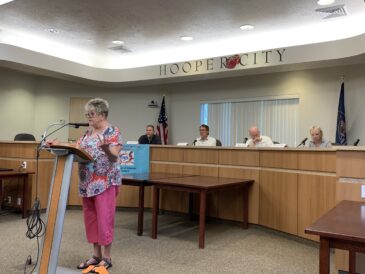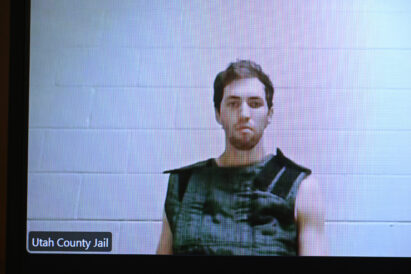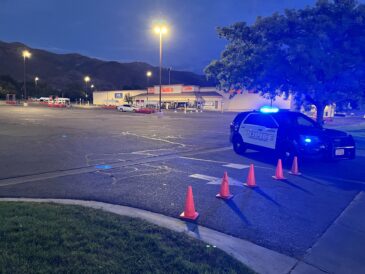‘Compassion that kills’: Gov. Cox says ‘sea change’ in Utah’s homeless system is coming

Spenser Heaps for Utah News Dispatch
People congregate on Rio Grande Street in Salt Lake City on Wednesday, March 26, 2025.Projected on two large screens in front of a hotel conference room full of more than 300 people on Wednesday, a video told the story of Brandon Curtis, a Utahn who died at the age of 43 of a drug overdose on Aug. 16.
In the video, his father and stepmother, Ken and Steph Curtis, said his exposure to drugs started when he was about 7 years old, “with a babysitter who gave him marijuana to calm him down.” Ken Curtis said “his mother contributed to that,” adding that was the main reason they later divorced. Then in 2012, he said Brandon’s mother “killed herself with a drug overdose.”
“And that’s when he took a nose dive,” Ken Curtis said.
The video goes on to paint a sad story of Brandon Curtis’ life, saying he lived on the streets most of his life. Even though Ken and Steph Curtis tried multiple times to help, he’d always return to drugs. And they said the legal and criminal justice system failed him at every turn, allowing Brandon too much leeway at a time when they said he could no longer make decisions for himself.
“I understand people having privacy rights, but when the kid won’t get himself off of drugs and cannot make those real decisions that keep him sober and keep him a normal member of society, we had no place to go,” Ken Curtis says. “Even as Brandon’s dad, biological father, I had no rights over Brandon.”
They said Brandon’s sister at one point took him to Colorado, where he stayed in a group home and achieved six months of sobriety. In those six months, Ken Curtis said Brandon “became a totally different person.”
“He could think rationally. I wouldn’t say he was completely healthy because he still had a lot of mental issues, but he was in a good place,” Ken Curtis said.
But that didn’t last.
“The pull was just too great to come back to Salt Lake City, because Salt Lake City was where he could do whatever he wants to do,” Steph Curtis said through tears. “Without repercussion,” Ken Curtis added.
Within two months, Brandon Curtis was dead.
The video then issued a call to action: something needs to change.
‘Compassion trap’
Brandon’s story was a somber preface to a panel discussion between Utah Gov. Spencer Cox and author Sam Quinones, who has written multiple books chronicling the opioid crisis in America, the emergence of the synthetic drug market in Mexico, and their impact on homelessness and mental illness across America.
During their conversation, Cox and Quinones explored solutions to both America and Utah’s homelessness, addiction and mental health problems. Curtis’ story underscored a takeaway that both Cox and Quinones embraced – that there needs to be a better balance between compassion, law enforcement and accountability.
“We’ve been given a false choice, that you can either be compassionate or you can hold people accountable and responsible. And I think that’s a huge mistake,” the governor said. “People are right when they say you can’t arrest your way out of homelessness. They’re absolutely right. But you also can’t do nothing. You do have to arrest people at times.”
Wednesday’s conference was hosted by the homelessness advocacy group Solutions Utah. The group was formerly known as the Pioneer Park Coalition (originally founded as a coalition of business owners to advocate for revitalization around the downtown area that has a long history of grappling with homelessness issues) before it was rebranded last year to align with a mission of improving Utah’s statewide homeless services system.
Cox said he’s a “big fan” of Quinones, telling everyone they should read his book “The Least of Us: True Tales of America and Hope in the Time of Fentanyl and Meth.” He described it as key to understanding the intersection between pharmaceutical manufacturers “chasing dollars over lives” and what’s now become a vast synthetic drug market in Mexico that has exacerbated mental illness and homelessness across the U.S.
“I was blown away,” Cox said, adding that he made everyone on his team read it. He also said he’s been working with state lawmakers “to now change the way we attack not just drug trafficking but homelessness and all of the adjacent issues.”
Cox said Quinones’ books also urge people not to “fall into this compassion trap that is not compassionate at all, but it’s a compassion that kills. And we’ve forgotten the other side of that ledge, which is the responsibility of holding people accountable and then giving them solutions and treatment.”
A ‘sea change’ in Utah’s homeless system is already underway
The public talk between Cox and Quinones came on the heels of a legislative session in which lawmakers passed a slate of bills aimed at improving the state’s homeless system while also increasing enforcement. They passed laws formalizing a state partnership with Salt Lake City to police camping and drugs. They also passed legislation with anti-drug use measures, including enhanced penalties for drug offenses in homeless shelters and requiring homeless shelters to maintain zero-tolerance drug policies.
State homeless leaders say they want to change Utah’s homeless system to be focused on a “human first” approach in contrast with “Housing First,” a model that homeless providers in and outside of Utah have used for years that prioritizes placing people experiencing homelessness in permanent supportive housing as a first step, then offering services including substance abuse and mental health treatment.
Arguing that approach is too rigid and hasn’t worked, lawmakers also passed a resolution urging the federal government rescind housing-first mandates on federal grants and instead allow Utah more flexibility to craft its own solutions, including programs that focus on “sobriety, goal-setting, and accountability.”
In major cities across the country, including Salt Lake City, Cox said there’s been a “decay” that’s let homelessness, addiction and mental health issues fester. Over the past two years, he said state and city leaders have been trying to work together to make changes.
“I refuse to believe that we have to allow our capital city to be a place where families can’t walk down the street together … where we just let people die on the streets,” he said. “We cease to function as a society if we’re going to accept that. Might as well just end it all and cash it in and head for the hills.”
So while members of the Utah Homeless Services Board have been working to transform the state’s homeless system — including slow-going efforts to site a new, 1,200-bed homeless campus — Cox said more work needs to be done and “we’re not there yet.”
“We’re in the middle of this sea change,” he said. “We do need more jail beds. We do need more treatment beds. We’re working on those things.”
Cox also said one of Utah’s “superpowers” is also “compassion.” But he said that doesn’t mean people shouldn’t be arrested for breaking the law.
“I’m not going to allow people to put us in those boxes anymore … to tell us that if we’re getting serious about crime and serious about homelessness, and that means we don’t care about people,” Cox said. “We’re not going to do that anymore.”
Cox said Quinones’ book emphasizes that point. Quinones agreed.
“‘Meeting people where they are’ is a common phrase,” Quinones said. “But, you know, we know where they are. They’re on death row, they’re at death’s door. And we leave them there? … It bewilders me how that’s confused with compassion.”
‘Cheap’ dopamine, addiction and unbridled capitalism
Much of Cox and Quinones’ discussion revolved around the devastating impacts of fentanyl and other synthetic drugs that have sent the number of fatal overdoses in Utah and the U.S. to record highs. But their talk also zoomed out to highlight broader problems in American culture that fuel other types of addiction, which breed despair in many forms that can eat away at people and their communities.
It’s not just drugs. It’s an addiction to phones, doom scrolling on social media, and online gambling, Cox said. Things that made dopamine “cheap.”
“There’s a hollowness that’s happening in our country today as we become more addicted to our cellphones, dopamine hits,” the governor said. “Social media? Dopamine hit. Outrage? Dopamine hit. We’re addicted to all this stuff. … And we’re in pain. There’s that God-shaped hole in our hearts.”
Cox said “friction” needs to disrupt these habits — but also Americans “need to change our mindset as a society.”
“I’m just telling you right now, we’re going to have a lot of homeless people because of DraftKings on your phone,” Cox said, referring to an online sports gambling company.
While residents of Utah — one of only two states, including Hawaii, where gambling is illegal — have previously had to drive across state lines to place bets, now they can do it on an app. Cox asserted that the ease of placing bets and gambling ads are going to “destroy our country.”
“If it’s in your pocket every damn day and they are sending you notifications that you have to bet on this, that’s fentanyl in phone form. That’s exactly what it is,” Cox said. “You’re going to be losing your house. And then you’re going to be sad, and you’re going to be on the street, and you’re going to be looking for something else to scratch that itch. And you’re going to be buying drugs to do it.”
The problem, Cox said, is “dopamine got cheap,” and Americans have lost sight of what brings true happiness.
“We decided that freedom to do anything we want is an American core value,” Cox said, “and we forgot that the pursuit of happiness in the Declaration of Independence was actually about self improvement and self excellence — about making ourselves better every day, about doing the hard stuff and taking care of people instead of just living for the moment.”
Cox got a round of applause for those words. Quinones nodded his agreement, though he went a step further in pointing out problems that also stem from underregulated capitalism.
“Today we have decided that it’s OK for corporate America to fine tune these products to be more addictive than ever,” Quinones said, calling gambling apps “vile things.”
He questioned whether any of these company owners have paid attention to what happened to the Sackler family, which owned the pharmaceutical company Purdue Pharma that recently agreed to pay $7.4 billion in a settlement over the role OxyContin played in the opioid epidemic.
“We do a really bad job of standing in the way of people who want to make money,” Quinones said.
But what do synthetic drug markets have to do with social media and gambling apps? In a review of “The Least of Us,” Washington Post writer David Herzberg said Quinones’ “greatest accomplishment is to understand these newly dangerous drug markets as just one more consequence of a disastrously under-regulated corporate capitalism in the 2000s.”
“In the annals of American drug journalism (of which, as a historian, I have read a lot), this is a remarkable argument: that drugs are not the problem, they are just one example of our decision to favor markets over communities,” Herzberg wrote.
That’s where swimming pools come in.
What’s the solution? ‘Swimming pools’
To explain, Quinones told the story behind the title of his other book, “Dreamland: The True Tale of America’s Opiate Epidemic.” Though the word “dreamland” could also refer to the high heroin addicts chase, he said it more directly refers to a community pool that was once a popular spot in Portsmouth, Ohio.
But after the Rest Belt phenomenon, when manufacturing and steelmaking regions saw industrial decline, “jobs left, businesses withered, half the population left, and Dreamland Pool … could no longer survive,” Quinones said. “They dug it up, and they turned it into a strip mall.”
The community bonds were then “shredded,” he said. “And then within two or three years, the opioid prescribing got heavy. And the pill mill business model … was really invented in Portsmouth, Ohio.”
He chose the name “Dreamland” because he said it was a “quintessential example of what I thought was really at the heart of our opioid problem, our addiction problem in general, which was a shredding of community. … Getting away from what held us together and bonded us, which we have lost in so many cases.”
Cox said one of the biggest takeaways he got from Quinones’ books is “that we literally need more swimming pools.”
He said there should be more investment in building community spaces, like swimming pools or splash parks.
Though he said much of their conversation was grim, Cox said he hoped to end it on a hopeful note. If any state can combat loneliness and addiction, it’s Utah, he said.
“As much as we’re losing these connections as a country, we still have them more than anywhere else here,” he said. “We still have a faith-based community that brings everyone together.”
So as people contemplate trying to fix homelessness and addiction, Cox said to not forget about ways to prevent it from happening in the first place, and that’s to “build strong kids who have a sense of worth, who are tied to their communities, who know their neighbors, who hate to disappoint their scoutmaster or their church leader by taking one of those pills.”
“That only happens if we have strong communities,” he said.
Utah News Dispatch is part of States Newsroom, the nation’s largest state-focused nonprofit news organization.



